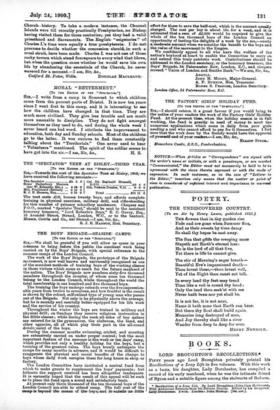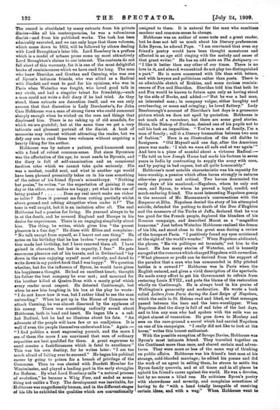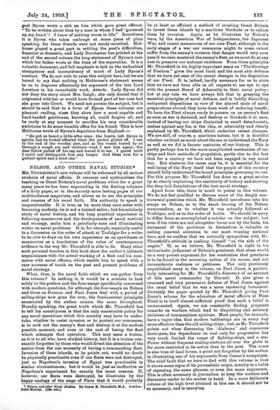BOOKS.
LORD- BROUGHTON'S RECOLLECTIONS.* FIFTY years ago Lord Broughton privately printed his Recollections of a Long Life in five volumes. With this work as a basis, his daughter, Lady Dorchester, has compiled a record of his early manhood, when he was the intimate friend of Byron and a notable figure among the stalwarts of Reform.
• Recollections of a Long Lift. By Lord Broughton (John Cam HoLhouse), With Additional Extracts from his Private Diaries. Edited by his Daughter.
reernosonener: Z.iola. London: Joh:LH:maw [Be. net.]
The record is elucidated by many extracts from his private diaries—like all his contemporaries, he was a voluminous diarist—and from his published works. The task has been admirably executed, and we can only hope that these volumes, which come down to 1822, will be followed by others dealing with Lord Broughton's later life. Lord Rosebery in a preface which is a model of urbane prose sums up most attractively Lord Broughton's claims to our interest. The contents do not fall short of this warranty, for it is one of the moat delightful books of reminiscences which we have read for long. The man who knew Sheridan and Grattan and Canning, who was one of Byron's intimate friends, who was allied as a Radical with Burdett and went to gaol for his opinions, who was in Paris when Waterloo was fought, who loved good talk in any circle, and bad a singular talent for friendship,—such a man could not write a dull diary if he had tried. As they stand, these extracts are discretion itself, and we can only assume that that discretion is Lady Dorchester's, for John Cam Hobhouse was a man of strong views who could comment sharply enough when he wished on the men and things that displeased him. There is no raking up of old scandals, for which we'are grateful; but at the same time we get a very intimate and pleasant portrait of the diarist. A book of memories may interest without attracting the reader, but we defy any one to read these two volumes without acquiring a hearty liking for the author.
Hobhouse was by nature a patient, good-humoured man with a fund of robust common-sense. But since Byronism was the affectation of the age, he must needs be Byronic, and the diary is full of self-examination and an occasional to-edium vitae which we cannot take quite seriously. His was a modest, candid soul, and what in another age would have been phrased prosaically takes on in his case something of the colour of his friend Byron's misanthropy. "Nothing but praise," he writes, "or the expectation of gaining it one day or the other, ever makes me happy; yet what is the use of being praised ? Does my real merit make me richer or taller ? Does it prevent me from rotting partially whilst above ground and rotting altogether when under it ? " The tone is well caught, but it is an imitation after all. The real Hobhouse had a passion for living. He yearned always to be in at the death, and he covered England and Europe in his desire for experiences. There is an engaging simplicity about him. The thing, he writes, which gives him "the purest pleasure is a fine day." He dines with Ellice and complains : "No talk except from myself, so I learnt not one thing." He notes on his birthday that he has broken "every good resolu- tion made last birthday, but I have renewed them all. I have gained in character, but lost in capacity, I fear." He gets enormous pleasure out of his travels, and in Switzerland "lay down in the sun enjoying myself most entirely, and dared to write down in my pocket-book that I was happy." We question whether, but for the influence of Byron, he would have given his happiness a thought. He had an excellent heart; thought his father the best company he ever met ; and mourned for the brother killed at Quatre-Bras with a manly grief which every reader must respect. He detested Castlereagh, but when he saw him laughing in his box at the play he wrote : "I do not know how it was, but I rather liked to see the man unbending." When he got up in the House of Commons to attack Canning, he was almost disarmed by the applause of his enemy. There was something radically sound about Hobliouse, both in bead and heart. He began life a a red- .hot Radical, but be had no illusions about his fate. "An advocate of the people will have few or no coadjutors. It is well if even the people themselves understand him." Again :— " I find politics a most engrossing pursuit, and the more I see of them the more I am convinced that men of ordinary capacities are best qualified for them. A great eagerness to excel creates a fastidiousness which is fatal to excellence." This was his own destiny, for he writes later : "I am too much afraid of failing over to succeed." He began his political career by going to prison for a breach of privilege of the Commons. Then he was elected with Burdett Member for Westminster, and played a leading part in the early struggles for Reform. By what Lord Rosebery calls "a natural process of evolution," he became a Whig Peer, and ended as some- thing not unlike a Tory. The development was inevitable, for .Hobhouse was magnificently human, and in the different stages of his life he exhibited the qualities which are conventionally
assigned to them. It is natural for the man who combines candour and common-sense to change.
Hobhouse was an author of some note and a great reader, but he does not tell us much about his literary preferences.
Like Byron, he adored Pope. "I am convinced that even my friend's poetry would have been thought monstrous and affected in an age still ringing with the melody and sense of
that great writer." He has an odd note on The Antiquary :— "I like it better than any other of our times. There is no love in it, and absurd womankind do not play too distinguished a part." He is more concerned with life than with letters, and with lawyers and politicians rather than poets. There is an admirable sketch of Erskine, and some curious reminis- cences of Fox and Sheridan. Sheridan told him that both he and Fox would be known to future ages only as having stood by the side of Burke, and added :—" But he was a bad man, an interested man ; in company vulgar, either haughty and overbearing, or mean and cringing ; he loved flattery." Lady Bessborough's account of Sheridan's last days is a gruesome picture which we dare not spoil by quotation. Hobhouse is not much of a raconteur, but there are some good stories. Shute, the Bishop of Durham, desired one of his pupils not to call his task an imposition. "You're a man of family, I'm a man of family ; call it a literary transaction between two men of fashion." Here is an illustration of the old dislike to foreigners. "Old Meynell said one day, after the American peace was made : 'I wish we were all safe and at war again.'" And here is a piece of scandal about a virtuous Radical
" He told us bow Joseph Hume had made his fortune in seven years in India by contracting to supply the army with corn, and by paying in bad rupees, but all quite honourably."
Hobhouse's most notable characteristic was his capacity for hero-worship, a passion which often burns strongly in natures otherwise prosaic and critical. Two heroes dominated the early days of his manhood,—Napoleon, whom he only met once, and Byron, to whom be proved a loyal, candid, and much-enduring friend. The most interesting Napoleon gossip is the account of Mr. Macnamara's conversations with the Emperor at Elba. Napoleon denied the story of his attempted suicide, defended the putting to death of the Due d'Engbien and the massacre of the Turks at Jaffa, declared that he was too good for the French people, deplored the blunders of his Russian campaign, and described Murat as a " magnifica lazzarone." Just before Waterloo Hobhouse realised the dream of his life, and stood close to the great man during a review of the troops at Paris. "I positively found my eyes moistened at the sight of the world's wonder." When Napoleon abdicated, the phrase, "Ma vie politique est terminee," cut him to the heart. He has many stories of Waterloo, and is honestly enraged at the rumours which charged Napoleon with cowardice. "What pleasure or profit can be derived from the support of the paradox that a man who has commanded in fifty pitched battles is a coward ?" Hobhonse was in Paris when the English entered, and gives a vivid description of the spectacle. He made every effort to get his Government to refrain from restoring Louis XVIII., and puts the blame of the restoration wholly on Castlereagh. He is always loud in his praise of Wellington's generosity and moderation. He wrote a book called Letters from Paris during the Last Reign of Napoleon, which the exile in St. Helena read and liked, so that messages passed between the hero and the hero-worshipper. When Napoleon died the diary is full of sad tales of the last days, and to him any man who bad spoken with the exile was an object almost of veneration. He goes down to Moulsey and sees on the race-ground a sorrel which had carried Napoleon on one of his campaigns. "I really did not like to look at the horse," writes this honest enthusiast.
With the possible exception of Scrope Davies, Hobhouse was Byron's most intimate friend. They travelled together on the Continent more than once, and shared certain mad adven- tures. They were more or less of the same way of thinking on public affairs. Hobhouse was his friend's best man at his strange, cold-blooded marriage; he edited his poems and did the work of an agent in selling them, be strove to settle the Byron family quarrels, and at all times and in all places be upheld his friend's cause against the world. He was a devotee, but by no means a blind one. He criticises Byron's poetry with shrewdness and severity, and complains sometimes of having to do "with a head totally incapable of receiving certain ideas, and with a wag." When Hobhouse went to
gaol Byron wrote a skit on him which gave great offence. "To be written about thus by a man in whom I had 'garnered up my heart' I I know of nothing worse in life." Sometimes it is Byron who takes umbrage at some piece of plain
speaking, for these friends were not mealy-mouthed. Hob- house played a great part in settling the poet's difficulties,
financial or domestic, and Lady Dorchester has printed at the end of the second volume the long statement of Byron's case which her father wrote at the time of the separation. It is a valeable document, and full emphasis is laid on the undoubted strangeness and inconsistency of much of Lady Byron's 'conduct. We do not wish to raise this subject here, but we are bound to say that nothing in Hobhouse's statement seems to us to disprove effectually the argument of the late Lord Lovelace in his remarkable work, Astarte. Lady Byron did not deny the story about Mrs. Leigh; she only denied that it originated with her or would have formed part of her case had she gone into Court. We need not pursue the subject, but it
should be said that to a lover of Byron these volumes are pleasant reading, sinee they show bow a most capable and
hard-headed gentleman, knowing all, could forgive all, and be ready at any moment to sacrifice his very considerable ambitions to do some humble office for his friend. This is how Hobliouse wrote of Byron's departure from England:— "He got on board a little after nine : the bustle left Byron in spirits, but he looked affected when the packet glided off. I ran to the end of the wooden pier, and as the vessel tossed by us through a rough sea and contrary wind, I saw him again; the dear fellow pullea off his cap and waved it to me. I gazed until I could not distinguish him any longer. God bless him for a gallant spirit and a kind one."




































 Previous page
Previous page